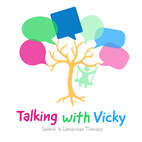Using Two or More Words Advice
We all talk to children in long sentences. A child learns to listen to and select the most important words that they need to learn first in order to communicate their needs. They then start to say words and link them together until they can make full sentences. Children often need help to learn to link words together.
When they are starting to say a growing range of single words you can help them begin to join words together by making simple changes to your everyday routines. Early phrases a child will say often just contain the main bits of information e.g. ‘go slide’, ‘up mummy’, ‘more biscuits’. They miss out the smaller less important words we use when we make sentences. Children who are finding it hard to link words can benefit from simple sentences being said to them using the main key words that they need to understand and then use.
For example, a parent could say ‘OK I think you have had enough food now so let’s clean you up and get you down so you can go and play again?’ Alternatively she could say ‘Jack, have you finished?, (pause), finished?’ or ‘Do you want to get down?, (pause), get down?’
Top tips to help a child learn to link words:
When a child is linking two words together, help them to make simple three-word phrases in the same way. This time give lots of examples of simple three-word phrases such as:
When they are starting to say a growing range of single words you can help them begin to join words together by making simple changes to your everyday routines. Early phrases a child will say often just contain the main bits of information e.g. ‘go slide’, ‘up mummy’, ‘more biscuits’. They miss out the smaller less important words we use when we make sentences. Children who are finding it hard to link words can benefit from simple sentences being said to them using the main key words that they need to understand and then use.
For example, a parent could say ‘OK I think you have had enough food now so let’s clean you up and get you down so you can go and play again?’ Alternatively she could say ‘Jack, have you finished?, (pause), finished?’ or ‘Do you want to get down?, (pause), get down?’
Top tips to help a child learn to link words:
- When possible say simple 2-word phrases for them to copy, e.g. ‘all gone’, ‘wash hands’, ‘eat sandwich’.
- Use everyday routines such as putting on shoes or washing in the bath ‘where are daddy’s boots?’, ‘let’s wash your toes’.
- Use books and describe what you can see using two key words.
- Talk about what is happening not what you are going to do next.
- Repeat the phrases many times.
- Use simple phrases in lots of different situations.
- Use words which are common everyday words. If unsure start with words that are in these semantic groups – food items, animals, toys, body parts, clothes and simple action words.
When a child is linking two words together, help them to make simple three-word phrases in the same way. This time give lots of examples of simple three-word phrases such as:
- duck eating bread
- mummy brushing teeth
- cat eating dinner
- Man kicking ball
- granny driving car
- daddy drinking tea
N.B. This advice is only to be used alongside therapy and with support and guidance from a Speech and Language Therapist.
Email Address: talkingwithvicky@gmail.com

